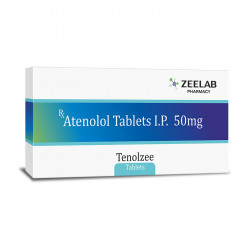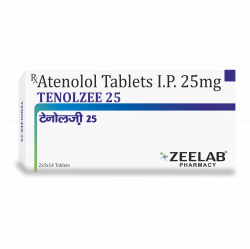Atenolol
Atenolol is a beta-blocker medication used primarily to treat high blood pressure (hypertension) and heart-related conditions such as angina and arrhythmias. It works by slowing down the heart rate and reducing its workload, thereby helping to control blood pressure and prevent heart attacks. Atenolol is widely prescribed for cardiovascular health and is often part of a long-term treatment plan. It is essential to take this medication as directed by a doctor to achieve the best results while minimizing potential side effects.
Uses of Atenolol
- Treatment of high blood pressure (hypertension)
- Management of angina (chest pain)
- Prevention of heart attacks
- Control of irregular heartbeats (arrhythmias)
- Reduction of migraine frequency
- Management of anxiety-related palpitations
How Atenolol Works
Atenolol works by blocking beta-adrenergic receptors in the heart, reducing heart rate and blood pressure. This lowers the strain on the heart, making it more efficient and reducing the risk of cardiovascular complications. By slowing the heart rate, Atenolol also helps in managing arrhythmias and preventing angina episodes.
Benefits of Atenolol
- Effectively lowers high blood pressure
- Reduces the risk of heart attacks and strokes
- Prevents angina and chest pain episodes
- Controls irregular heart rhythms
- Reduces symptoms of anxiety-induced palpitations
- Helps prevent migraine headaches
How to Take Atenolol
Atenolol should be taken as prescribed by a doctor. It is usually taken once daily, with or without food. Swallow the tablet whole with a glass of water. Consistency in taking the medication at the same time every day is essential for optimal effectiveness. Do not stop taking Atenolol suddenly, as it may cause withdrawal effects like increased heart rate and blood pressure spikes.
Types of Dosage Available
- 25 mg tablets
- 50 mg tablets
- 100 mg tablets
Side Effects of Atenolol
- Fatigue and dizziness
- Low blood pressure
- Slow heart rate (bradycardia)
- Cold hands and feet
- Nausea and digestive issues
- Shortness of breath (especially in asthma patients)
- Depression or mood changes
- Sleep disturbances
Safety Advice
- Take the medication as prescribed by your doctor
- Avoid alcohol, as it may lower blood pressure too much
- Not suitable for people with severe asthma or respiratory disorders
- Do not stop the medication suddenly to prevent withdrawal symptoms
- Monitor your blood pressure regularly
- Inform your doctor about any pre-existing kidney or heart conditions
Frequently Asked Questions (FAQs)
Q. Can Atenolol be used for anxiety?
A. Yes, Atenolol can help manage anxiety-related symptoms like palpitations and rapid heartbeat, but it is primarily prescribed for heart conditions.
Q. Is Atenolol safe for long-term use?
A. Yes, it is generally safe for long-term use when taken as prescribed. Regular check-ups are recommended to monitor its effects.
Q. Can I stop taking Atenolol suddenly?
A. No, stopping Atenolol abruptly can cause withdrawal symptoms such as increased heart rate and high blood pressure. Always consult your doctor before discontinuation.
Q. Does Atenolol cause weight gain?
A. Atenolol does not directly cause weight gain, but it may lead to fatigue, which can reduce physical activity and indirectly contribute to weight changes.
Q. Can I take Atenolol with other blood pressure medications?
A. Yes, Atenolol is sometimes combined with other blood pressure medications. However, always consult your doctor before combining it with other drugs.
Download India's most affordable pharmacy app
- Compare with medicine prices
- Save upto 90% on your medicine bills

Temperature Controlled storage and delivery

Regular Sanitization

Disinfected Packaging
















 Added!
Added!